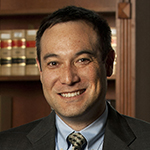John Inazu, JD, PhD, associate professor of law
In the early days of the Ferguson protests this past August following the death of Michael Brown, President Obama insisted that “our constitutional rights to speak freely, to assemble, and to report in the press must be vigilantly safeguarded: especially in moments like these.” He was right. And the connections between speech, assembly, and press are more than a rhetorical convenience. They remind us of the importance of First Amendment rights working together, and the convergence of those rights in an important constitutional doctrine known as the public forum.
The public forum refers to government owned spaces where viewpoints become voices. The government owns and manages the land and the physical structures built upon it. But within these spaces, anyone can say almost anything. On public streets, parks, and sidewalks, citizens can voice anger, outrage, and discontent. Their expression cannot be violent, and it cannot incite others to violence—those are essential lines that law enforcement rightly maintains. But expression in pubic forums is otherwise fairly unrestrained: it can be verbal or nonverbal, rational or emotional, reserved or unleashed.
The public forum is essential to our democratic experiment. It provides a practical mechanism for citizens to gather, express, and engage—on topics and issues of their choosing, in their ways, and on their terms. In the memorable words of the legal scholar Harry Kalven, “In an open democratic society the streets, the parks, and other public places are an important facility for public discussion and political process. . . . [T]he generosity and empathy with which such facilities are made available is an index of freedom.”
The ideal of the public forum represents one of the most important aspects of a healthy democracy. It signifies a willingness to tolerate dissent, discomfort, and even instability. These intuitive connections are not lost on the writers of the hit television show, Parks & Rec. When a delegation from a Venezuelan Parks & Rec department visits the fictional town of Pawnee, Indiana, their leader Raul expresses dismay upon observing a public forum: “This is outrageous. Where are the armed men to take the protesters away? Where are they? This kind of behavior is never tolerated in Baraqua. Shout like that, they put you in jail. Right away. No trial, no nothing. Journalists, we have a special jail for journalists.”
Note: Portions of this post are extracted from a forthcoming book, “Confident Pluralism.”
Read full article on Yale Books Unbound

President Obama insisted that, “Blah, blah blah blah blah…” First of all, I don’t need a president to tell me about the importance of the first amendment. Secondly, that man’s words ring pretty hollow when one considers that his administration has prosecuted more whistle blowers than all of the previous presidential administrations combined.